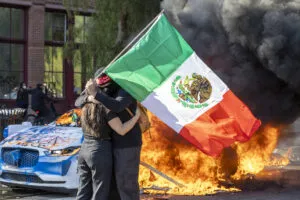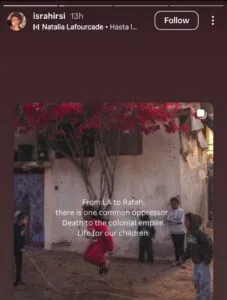RSS
Did You Know Pro-Palestinian Activists Are Fueling Riots in LA and Elsewhere?

Illustrative: May 1, 2024; Los Angeles, California, USA; A flag is waved during a sit-in outside of a pro-Palestinian encampment at the campus of UCLA. Violence broke out early in the morning at the encampment, hours after the university declared that the camp “is unlawful and violates university policy.” Photo: USA TODAY Network via Reuters Connect.
On Friday, June 6, US Immigration and Customs Enforcement (ICE) launched a series of coordinated raids across Los Angeles, detaining dozens of individuals accused of being in the United States illegally. The arrests — made at both workplaces and homes — sparked immediate backlash and sometimes violent protests.
Similar protests emerged in other major cities, though none matching the violence witnessed in LA.
The riots have dominated headlines across the US, fueling a national debate over immigration policy, the limits of Federal authority, and the broader ambitions of the Trump administration’s security agenda.
But amid all this coverage, one detail has been quietly omitted — or perhaps deliberately brushed aside: the unmistakable role of pro-Palestinian activists in the riots. Not merely present — but masked, vocal, and often leading the charge in the most violent flashpoints.
Footage posted online shows rioters draped in keffiyehs and waving PLO flags as they attack police officers, torch cars and public property, and hurl Molotov cocktails.
One particularly disturbing video shows a crowd gathered on a highway overpass, waving a massive Palestinian flag and pelting police cruisers below with rocks — many in the crowd wearing the traditional Palestinian head covering.
This is ANARCHY and attempted murder.
Anti-deportation protesters holding Palestinian flags while attempting to kill police officers by throwing heavy rocks through the windshields police cars driving on a highway in Los Angeles.
Pay attention to the flags on the bridge. pic.twitter.com/tTDgoPgiWI— James Terrell (@TitterStretch) June 11, 2025
In another image, a masked rioter wears a PFLP headband while hoisting a Mexican flag — a jarring emblem not of solidarity, but of how seamlessly the anti-Israel agenda has inserted itself into a protest about something else entirely.

A rioter wearing a PFLP headband in Los Angeles.
Activist leaders have not exactly been subtle about their intentions. Groups like Students for Justice in Palestine, the Palestinian Youth Movement, PAL-Awda, Within Our Lifetime, and others have openly called on their followers to join the protests, framing the unrest as part of a broader campaign to “globalize the intifada.”
National SJP posted an image depicting Trump administration officials adorned with a swastika, labeling it “the Fourth Reich” and urging action.
“We have a duty to resist oppression wherever it manifests: from the barrios of LA to the refugee camps of Bethlehem,” the group declared. “We will globalize the intifada.”

Isra Hirsi, daughter of anti-Israel congresswoman Ilhan Omar (D-MN and recently suspended from Columbia University over her role in violent campus protests, posted on Instagram: “From L.A. to Rafah, there is one common oppressor. Death to the colonial empire. Life for our children.” She also shared a screenshot reading, in all caps: “F**K ICE!”

She’s far from alone. Dozens of high-profile anti-Israel activists have used their platforms to encourage participation in the anti-ICE demonstrations.
And yet, in the pages of major newspapers and the broadcasts of primetime news, you’d be forgiven for thinking none of this ever happened. Mentions of the Palestinian flag are fleeting. The presence of anti-Israel groups is buried or ignored entirely.
CNN’s Shimon Prokupecz offered perhaps the most honest nod to reality when he observed that “people are holding signs saying ‘ICE out of New York City.’ We’ve seen flags of Mexico, we’ve seen the Palestinian flag” — before quickly moving on.
Not one mainstream outlet has thought to investigate the deeper connections — to ask whether this is spontaneous grassroots outrage or something more orchestrated. Not one has paused to consider how a domestic protest about immigration raids morphed into yet another anti-Israel battleground.
Because to acknowledge the truth — that a significant faction of these riots is being driven by activists who endorse violence, call for an intifada, and seek to destroy Israel and dismantle the United States — would disrupt the media’s preferred narrative: that this is a righteous uprising of marginalized communities reacting to injustice. So they don’t.
Instead, they turn a blind eye, bury the lede, and pretend the keffiyehs, chants, and Molotov cocktails are just another expression of grassroots dissent.
The author is a contributor to HonestReporting, a Jerusalem-based media watchdog with a focus on antisemitism and anti-Israel bias — where a version of this article first appeared.
The post Did You Know Pro-Palestinian Activists Are Fueling Riots in LA and Elsewhere? first appeared on Algemeiner.com.
RSS
After False Dawns, Gazans Hope Trump Will Force End to Two-Year-Old War

Palestinians walk past a residential building destroyed in previous Israeli strikes, after Hamas agreed to release hostages and accept some other terms in a US plan to end the war, in Nuseirat, central Gaza Strip October 4, 2025. Photo: REUTERS/Mahmoud Issa
Exhausted Palestinians in Gaza clung to hopes on Saturday that US President Donald Trump would keep up pressure on Israel to end a two-year-old war that has killed tens of thousands and displaced the entire population of more than two million.
Hamas’ declaration that it was ready to hand over hostages and accept some terms of Trump’s plan to end the conflict while calling for more talks on several key issues was greeted with relief in the enclave, where most homes are now in ruins.
“It’s happy news, it saves those who are still alive,” said 32-year-old Saoud Qarneyta, reacting to Hamas’ response and Trump’s intervention. “This is enough. Houses have been damaged, everything has been damaged, what is left? Nothing.”
GAZAN RESIDENT HOPES ‘WE WILL BE DONE WITH WARS’
Ismail Zayda, 40, a father of three, displaced from a suburb in northern Gaza City where Israel launched a full-scale ground operation last month, said: “We want President Trump to keep pushing for an end to the war, if this chance is lost, it means that Gaza City will be destroyed by Israel and we might not survive.
“Enough, two years of bombardment, death and starvation. Enough,” he told Reuters on a social media chat.
“God willing this will be the last war. We will hopefully be done with the wars,” said 59-year-old Ali Ahmad, speaking in one of the tented camps where most Palestinians now live.
“We urge all sides not to backtrack. Every day of delay costs lives in Gaza, it is not just time wasted, lives get wasted too,” said Tamer Al-Burai, a Gaza City businessman displaced with members of his family in central Gaza Strip.
After two previous ceasefires — one near the start of the war and another earlier this year — lasted only a few weeks, he said; “I am very optimistic this time, maybe Trump’s seeking to be remembered as a man of peace, will bring us real peace this time.”
RESIDENT WORRIES THAT NETANYAHU WILL ‘SABOTAGE’ DEAL
Some voiced hopes of returning to their homes, but the Israeli military issued a fresh warning to Gazans on Saturday to stay out of Gaza City, describing it as a “dangerous combat zone.”
Gazans have faced previous false dawns during the past two years, when Trump and others declared at several points during on-off negotiations between Hamas, Israel and Arab and US mediators that a deal was close, only for war to rage on.
“Will it happen? Can we trust Trump? Maybe we trust Trump, but will Netanyahu abide this time? He has always sabotaged everything and continued the war. I hope he ends it now,” said Aya, 31, who was displaced with her family to Deir Al-Balah in the central Gaza Strip.
She added: “Maybe there is a chance the war ends at October 7, two years after it began.”
RSS
Mass Rally in Rome on Fourth Day of Italy’s Pro-Palestinian Protests

A Pro-Palestinian demonstrator waves a Palestinian flag during a national protest for Gaza in Rome, Italy, October 4, 2025. Photo: REUTERS/Claudia Greco
Large crowds assembled in central Rome on Saturday for the fourth straight day of protests in Italy since Israel intercepted an international flotilla trying to deliver aid to Gaza, and detained its activists.
People holding banners and Palestinian flags, chanting “Free Palestine” and other slogans, filed past the Colosseum, taking part in a march that organizers hoped would attract at least 1 million people.
“I’m here with a lot of other friends because I think it is important for us all to mobilize individually,” Francesco Galtieri, a 65-year-old musician from Rome, said. “If we don’t all mobilize, then nothing will change.”
Since Israel started blocking the flotilla late on Wednesday, protests have sprung up across Europe and in other parts of the world, but in Italy they have been a daily occurrence, in multiple cities.
On Friday, unions called a general strike in support of the flotilla, with demonstrations across the country that attracted more than 2 million, according to organizers. The interior ministry estimated attendance at around 400,000.
Italy’s right-wing government has been critical of the protests, with Prime Minister Giorgia Meloni suggesting that people would skip work for Gaza just as an excuse for a longer weekend break.
On Saturday, Meloni blamed protesters for insulting graffiti that appeared on a statue of the late Pope John Paul II outside Rome’s main train station, where Pro-Palestinian groups have been holding a protest picket.
“They say they are taking to the streets for peace, but then they insult the memory of a man who was a true defender and builder of peace. A shameful act committed by people blinded by ideology,” she said in a statement.
Israel launched its Gaza offensive after Hamas terrorists staged a cross border attack on October 7, 2023, killing some 1,200 people and taking 251 people hostage.
RSS
Hamas Says It Agrees to Release All Israeli Hostages Under Trump Gaza Plan

Smoke rises during an Israeli military operation in Gaza City, as seen from the central Gaza Strip, October 2, 2025. Photo: REUTERS/Dawoud Abu Alkas
Hamas said on Friday it had agreed to release all Israeli hostages, alive or dead, under the terms of US President Donald Trump’s Gaza proposal, and signaled readiness to immediately enter mediated negotiations to discuss the details.


